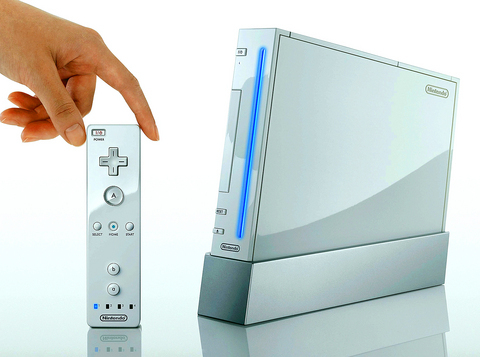Nintendo, maker of the GameCube video console, has surprised the industry with its answer to the increasingly high-tech consoles of its rivals: a simple, one-handed controller that players can also swing like a sword or a golf club.
Nintendo's controller was the star of the Tokyo Game Show, a three-day event that opened here on Friday, where Nintendo and its rivals, Sony and Microsoft, were trying to drum up interest in their new consoles. The three are vying for dominance as they scramble to roll out a new generation of game consoles.
While most controllers require two hands and are studded with an array of buttons and joysticks, the new Nintendo controller has fewer features, giving it the appearance of a TV remote control.

PHOTO: NINTENDO CO. LTD. VIA THE NY TIMES
The controller is intended for use with Nintendo's Revolution game console, the successor to GameCube. Revolution is scheduled for release sometime next year. It will go head to head with Microsoft's Xbox 360, scheduled to appear in November, and Sony's PlayStation 3, coming out next spring. It was clear on Friday that the three companies are taking very different tacks to attract consumers.
Nintendo hopes the simplicity of its new controller and games will make them more accessible, especially to first-time players. Sony, on the other hand, wants to make its PlayStation 3 the most technologically advanced console, giving it more lifelike graphics. Microsoft will probably use its Internet expertise to appeal to those who enjoy playing online against opponents they may never have met.
At a news conference to show the controller, Nintendo's president, Satoru Iwata, said his company wanted to make a device that was simple enough for anyone to use.
"A beginner or an expert player alike can enjoy this," he said.
Nintendo, known for game characters like Pokemon, Super Mario and Donkey Kong, hopes Revolution will catapult it ahead of the market leader, Sony.
Iwata said Nintendo wanted to develop a console that would appeal to a broader audience, including those who do not play video games now. He said consoles and games are now so complicated that many potential consumers are intimidated by them.
"We felt there was a crisis," he said. "People are scared away by the complexity of operating games. Even before they touch a game, they are afraid that it will be difficult, and stay away."
Another novel feature of Nintendo's new controller is its use of motion sensors. A demonstration video showed users shooting it like a gun and conducting a virtual orchestra by using it like a baton. The controller can also work with sports video games, allowing players to swing it like a tennis racquet or baseball bat.
"We need a controller that will sit on the table and invite anyone to touch it," Iwata said.

SEEKING CLARITY: Washington should not adopt measures that create uncertainties for ‘existing semiconductor investments,’ TSMC said referring to its US$165 billion in the US Taiwan Semiconductor Manufacturing Co (TSMC, 台積電) told the US that any future tariffs on Taiwanese semiconductors could reduce demand for chips and derail its pledge to increase its investment in Arizona. “New import restrictions could jeopardize current US leadership in the competitive technology industry and create uncertainties for many committed semiconductor capital projects in the US, including TSMC Arizona’s significant investment plan in Phoenix,” the chipmaker wrote in a letter to the US Department of Commerce. TSMC issued the warning in response to a solicitation for comments by the department on a possible tariff on semiconductor imports by US President Donald Trump’s

‘FAILED EXPORT CONTROLS’: Jensen Huang said that Washington should maximize the speed of AI diffusion, because not doing so would give competitors an advantage Nvidia Corp cofounder and chief executive officer Jensen Huang (黃仁勳) yesterday criticized the US government’s restrictions on exports of artificial intelligence (AI) chips to China, saying that the policy was a failure and would only spur China to accelerate AI development. The export controls gave China the spirit, motivation and government support to accelerate AI development, Huang told reporters at the Computex trade show in Taipei. The competition in China is already intense, given its strong software capabilities, extensive technology ecosystems and work efficiency, he said. “All in all, the export controls were a failure. The facts would suggest it,” he said. “The US

The government has launched a three-pronged strategy to attract local and international talent, aiming to position Taiwan as a new global hub following Nvidia Corp’s announcement that it has chosen Taipei as the site of its Taiwan headquarters. Nvidia cofounder and CEO Jensen Huang (黃仁勳) on Monday last week announced during his keynote speech at the Computex trade show in Taipei that the Nvidia Constellation, the company’s planned Taiwan headquarters, would be located in the Beitou-Shilin Technology Park (北投士林科技園區) in Taipei. Huang’s decision to establish a base in Taiwan is “primarily due to Taiwan’s talent pool and its strength in the semiconductor

French President Emmanuel Macron has expressed gratitude to Hon Hai Precision Industry Co (鴻海精密) for its plan to invest approximately 250 million euros (US$278 million) in a joint venture in France focused on the semiconductor and space industries. On his official X account on Tuesday, Macron thanked Hon Hai, also known globally as Foxconn Technology Group (富士康科技集團), for its investment projects announced at Choose France, a flagship economic summit held on Monday to attract foreign investment. In the post, Macron included a GIF displaying the national flag of the Republic of China (Taiwan), as he did for other foreign investors, including China-based